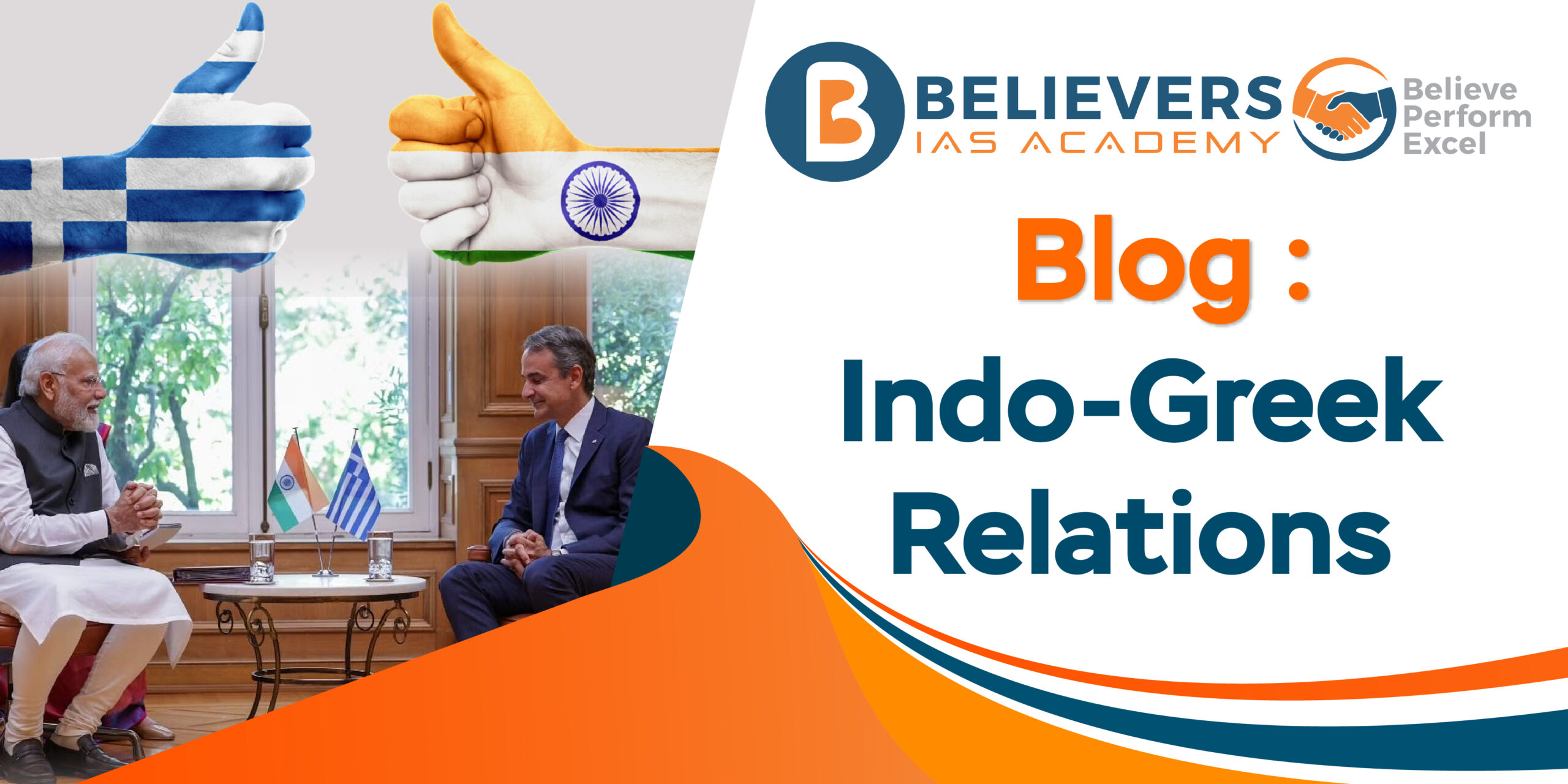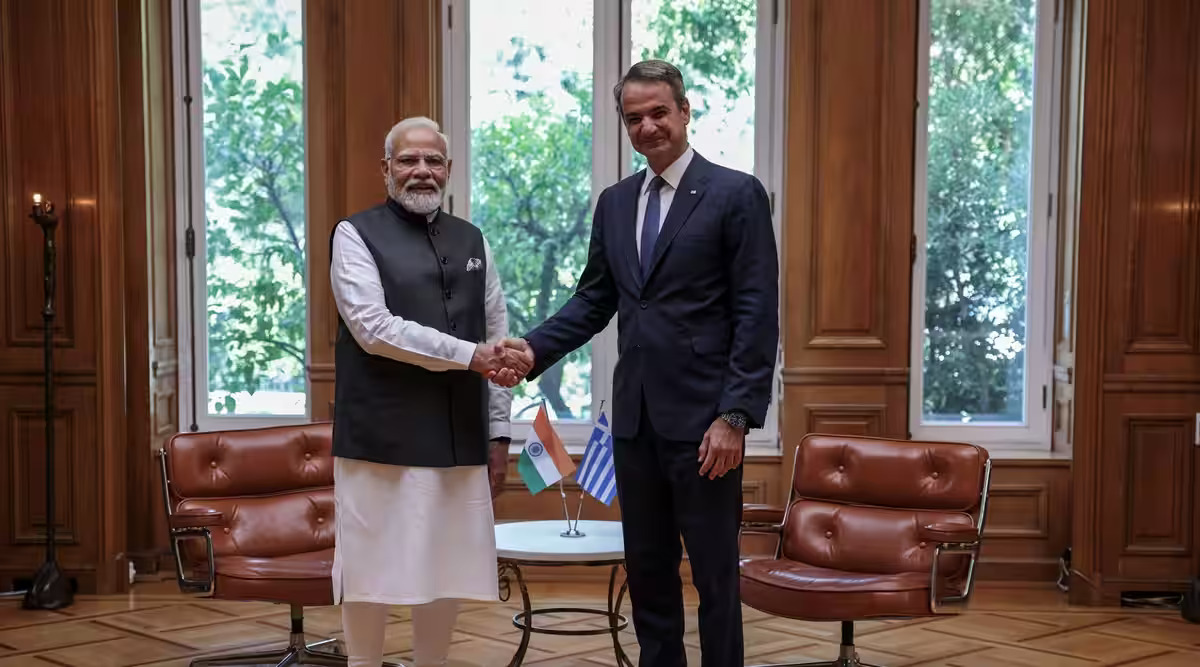Indo Greek Relationship
Indo-Greek Relationship From Ancient India
Alexander the Great’s campaign in India lasted from 327 BC to 325 BC. The Macedonian army launched an invasion into the Indian subcontinent after taking the Achaemenid Persian Empire. Alexander exceeded the prior borders that had been set by the Persian conquest of the Indus Valley within two years, expanding the Macedonian Empire to cover modern-day Punjab and Sindh in what is now Pakistan.
- The military expedition of Alexander the Great reached parts of northwest India in the fourth century BCE.
- Through this interaction, ties between Greek and Indian cultures were forged.
- The cultural environment was forever changed by Alexander.
Chandragupta Maurya and Seleucus I: 
- Following Alexander’s conquests, one of his successors, Seleucus I Nicator, maintained diplomatic and commercial ties with the Mauryan Empire in India.
- The Edicts of Ashoka document an alliance between Chandragupta Maurya and Seleucus I, demonstrating early political links.
Greco-Bactrian and Indo-Greek Kingdoms:
- The Greco-Bactrian and Indo-Greek Kingdoms were founded in the second century BCE by Greek emperors like Demetrius I and Menander I.
- Greek and Indian cultures came into direct contact throughout the reign of these kingdoms, resulting in a synthesis of artistic and architectural styles.
Art and architecture:
- During the Indo-Greek era, Indian and Greek aesthetic forms were combined.
- This synthesis was best exhibited by the Gandhara School of Art, which had its roots in modern-day Pakistan and Afghanistan.
- This period’s sculptures and artwork combine Greek and Indian elements.
Later times:
Byzantine Influence:
- Greece and India continued to engage through trade routes, particularly the Silk Road, in later times.
- These commercial ties reached the Byzantine Empire, among other places.
Ptolemaic Egypt:
- Through commercial channels that reached Egypt, the Greek influence in the Eastern Mediterranean was also connected to India.
European Discovery and Scholarly Contributions:
- Greek scholars made contributions to the study of Indian languages, philosophy, and cultural practices during the time of European discovery.
- This academic exchange improved Greece’s understanding of India.
Indian-Greek Relation in the Modern Times:
Diplomacy :
- Following India’s independence in 1947, Greece and India established diplomatic ties.
- Both New Delhi (1950) and Athens (1978) saw the opening of embassies.
High-Level Visits:
- Both countries’ leaders held high-level visits, which improved political ties.
- Heads of state and government representatives exchanging views facilitated communication and cooperation.
Collaborations at the International Level:
- In international institutions like the United Nations, both nations worked together.
- Discussions on topics like Kashmir and Cyprus were common interests.
- Nuclear Disarmament Accord: India and Greece participated in the 1985 Six-National Delhi Declaration on Nuclear Disarmament.
- This showed cooperation in the pursuit of international security.
- Developments recently:
- ongoing diplomatic relations, as evidenced by trips like President A.P.J. Abdul Kalam’s 2007 travel to Greece.
- During EAM’s visit in 2021, a Framework Agreement for the International Solar Alliance was inked.
- Greece and India work together in international organizations like the UN.
- India’s ambitions are supported by Greece, particularly its desire for a permanent seat on the larger UNSC.
Trade and Economic Relations :
- Trade between India and Greece has increased, now encompassing industries like agriculture, textiles, machinery, and pharmaceuticals.
- Both nations have stated a desire to strengthen their economic ties and look into potential business opportunities.
- Items for Export and Import: India exports a variety of goods to Greece, including aluminium, organic chemicals, textiles, spices, machinery, and automobiles.
- To India, Greece exports a variety of goods, including cotton, marble, machinery, cotton fibre, and aluminium foil.
Defence cooperation :
- Exchanges, training initiatives, and debates on local and international security issues are all part of defence cooperation.
- The Defence Cooperation Memorandum of Understanding (MoU) was signed in 1998.
- Participation in combined military exercises like “Blue Flag” and “INIOCHOS-23” is one example of cooperation.
- The Commonwealth War Graves Commission honours the sacrifice of Indian soldiers who gave their lives in Southern Europe during World War I.
Cultural and Academic ties:
- A deeper understanding of one another’s cultures has been cultivated through cultural exchanges.
- Discussion points have included philosophy, history, and the arts.
- Discussions on topics like history, philosophy, and archaeology have been made easier through collaboration at seminars and conferences.
Tourism and People-to-People Ties:
- Tourism between India and Greece is rising as more people visit historical monuments and cultural landmarks.
- Diaspora Connections: Diaspora relationships are facilitated by the Greek and Indian communities of Greek descent.




